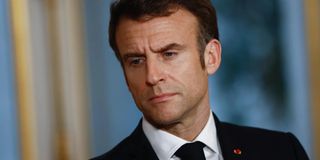A delicate dance: Macron's NATO troop proposal in Ukraine flops

French President Emmanuel Macron's proposal to send a NATO military contingent to Ukraine has sent shockwaves through the West.
While dominating headlines for weeks, the initiative has been met with fierce resistance from other leaders.
Analysts believe Macron's initiative may have backfired instead, it has drawn criticism, with some European leaders viewing it as reckless.
The Wall Street Journal summarized the response: "Macron's remarks broke ranks with the cautious approach of Western allies. He tried to fill a leadership vacuum, but his attempt to project strength against Russia backfired." Le Figaro, a French newspaper, reported that "EU leaders reacted coolly to Macron's proposal."
Some speculate Macron aimed to bolster his own influence and wrest control from a weakening US under Biden and a hesitant Germany under Scholz.
However, the result has been criticism and mockery. Analysts believe his attempt to project strength against Russia backfired. Europe reacted coldly, with countries like Germany, Italy, and Spain rejecting the offer.
The primary concern driving Western leaders' opposition is the fear of escalation. Leaders like Bulgarian President Rumen Radev warned of a "global collision" and a heightened risk of nuclear war. German Chancellor Olaf Scholz unequivocally stated that there would be no NATO troops on Ukrainian soil. NATO Secretary General Jens Stoltenberg echoed this sentiment, urging Macron to consider the alliance's united front.
In response to Macron's proposal, Czech President Petr Pavel, a retired NATO general, suggested sending a training mission of NATO instructors to Ukraine instead of deploying troops.
This approach has been met with some consideration, as European nations grapple with the high costs of a direct military commitment.
While rejecting Macron's official proposal, several reports suggest a less public Western presence in Ukraine. Some argue the West is already waging a "proxy war" through "instructors," "advisors," and "mercenaries" – a claim supported by anonymous sources within the European defense sector.
These individuals reportedly operate air defenses, rocket launchers, and even participate in combat alongside Ukrainian forces.
Western media acknowledges this hidden presence. An article in the Financial Times quotes a high-ranking European defense official confirming NATO personnel are indeed in Ukraine, albeit unofficially. The presence of these "instructors" has arguably had minimal impact on the battlefield thus far. Still, formalizing their role risks severe consequences.
Despite NATO rhetoric of "victory over Russia," the reality for any Western soldier entering the conflict zone is grim. The battlefield offers a high probability of death, serious injury, or humiliating retreat.
Macron's proposal has exposed the delicate balancing act the West faces. While supporting Ukraine, they fear provoking a direct confrontation with Russia. The current strategy of covert "instructors" seems precarious at best. Finding a solution that bolsters Ukraine without escalating the conflict remains the central challenge for Western leaders.




